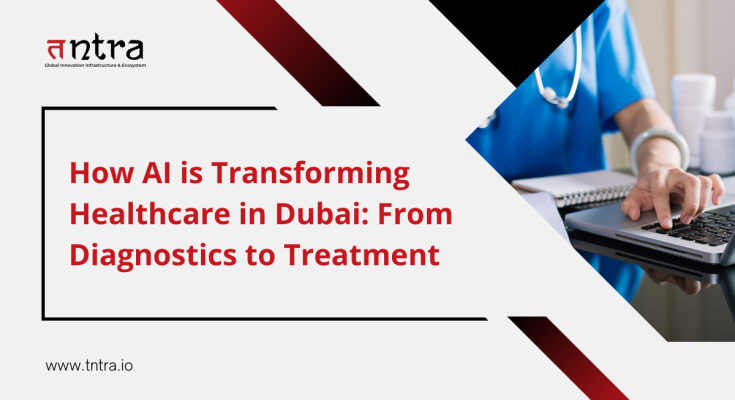Artificial Intelligence ensures healthcare providers achieve the best outcomes from their facilities. It allows for proactive care, personalized treatments, and predicts a patient’s future outcomes as well. As Dubai becomes a hub for AI implementation in healthcare, it will be interesting to see how it transforms its healthcare system. Continue reading to learn more.
Vezeeta is a digital outpatient single point of care that provides patients with fast, unmatched experiences at three essential outpatient touchpoints: doctor consultations, pharmacy, and diagnostics, which mainly involve lab sample collection.
With the help of a network of more than 50,000 highly regarded physicians in 43 specialties, Vezeeta provides seamless digital transformation services and platform that enables over 10 million patients to search, select, and book their healthcare providers based on actual patient reviews and ratings, live doctor scheduling, location, costs, and health insurance providers.
Patients can make appointments for in-person, online, or at-home consultations using the app. With the pharmacy solution, patients may also order their drugs, schedule home deliveries in 45 minutes, and schedule a lab sample collection in less than two hours.
(Source: WebEngage)
AI and Healthcare in UAE: By the Numbers
The size of the UAE’s artificial intelligence (AI) healthcare market was projected to reach USD 119 million by 2022. The UAE artificial intelligence (AI) healthcare market is expected to grow at a CAGR of 42.28% between 2023 and 2029, reaching a value of USD 987.6 million by that time.
There are about 9.4 million people living in the United Arab Emirates, and 85% of them are foreigners. The World Health Organisation reports that one in five UAE adults had diabetes and one-third of adult obesity. These relatively well-off people will demand better quality healthcare (made possible by digital transformation solutions) as the number of lifestyle-related ailments increases.
AI’s Role in Transforming Dubai’s Healthcare
AI in healthcare has been widely used in the healthcare industry by the UAE’s Ministry of Health, which has greatly advanced and enhanced patient care. The emergence of AI-enabled pods, which can monitor health and identify early indicators of illness, is one noteworthy example. AI in healthcare infrastructure will also be used by the Dubai Healthcare Authority (DHA) to treat diabetes retinopathy, a serious condition that can result in irreversible blindness. These changes demonstrate the UAE’s dedication to using AI to improve healthcare results. We believe that as DHA becomes more involved, AI will improve healthcare in the United Arab Emirates.
The AI-based preventative healthcare software solutions Enayati platform was recently introduced by the UAE Ministry of Health. This platform, which is a component of the nation’s National Agenda 2021, has the capacity to track individual health indicators and anticipate possible health hazards. With its smart technologies and applications, Enayati gives healthcare authorities access to real-time health data so they can respond quickly to any cardiac-related problems. Additionally, the utilization of anatomical models in conjunction with 3D printing techniques has allowed DHA hospitals to reduce expenses and enhance surgical outcomes. AI is improving healthcare in the United Arab Emirates in a number of methods as every software development company in Dubai moves towards AI.
The UAE is also seeing an increase in telemedicine services and virtual hospitals, which are changing the way healthcare is provided. The UAE’s Ministry of Health and the telecommunications provider Du are working together to create smart healthcare services, such as a telemedicine healthcare app development. The goal of this partnership is to give people, especially those living in rural areas, easy access to healthcare. Furthermore, inHealth, a UK-based health technology business, and Saal, an AI company based in Abu Dhabi, have partnered to take advantage of AI and introduce state-of-the-art healthcare solutions at a reduced cost. The UAE and the larger Middle East region’s citizens will receive better healthcare thanks to this agreement.
- Enabling proactive care
AI’s predictive analytics in healthcare software development is revolutionizing healthcare by providing proactive and preventive care, in addition to diagnostics. To foresee prospective health difficulties, predictive analytics uses data from multiple sources, such as medical records, family history, lifestyle choices, and environmental factors.
- Personalized treatment plans
AI in healthcare makes it possible for medical professionals to monitor the development of their patients’ illnesses and customize treatment plans based on the patients’ situations. By using real-time data to ensure optimal health management, this customisation helps physicians tailor care and treatments.
- Predictive patient analytics
AI software product engineering solutions make proactive interventions and preventative healthcare initiatives possible by predicting patient outcomes and identifying those who are at risk of developing particular illnesses. This predictive ability enhances patient management while lowering healthcare expenses and hospital admissions.
Closing Thoughts
AI healthcare is not meant to answer every question or serve as a substitute for professional medical treatment. Its strength is in answering calls at the front desk and using that information to act as an intelligent assistant for administrators and healthcare professionals. This allows it to elevate the patient experience through seamless service delivery. Accepting this technology by a software product engineering company frontier can reduce stress, increase productivity, and eventually protect the inhabitants of the United Arab Emirates.


